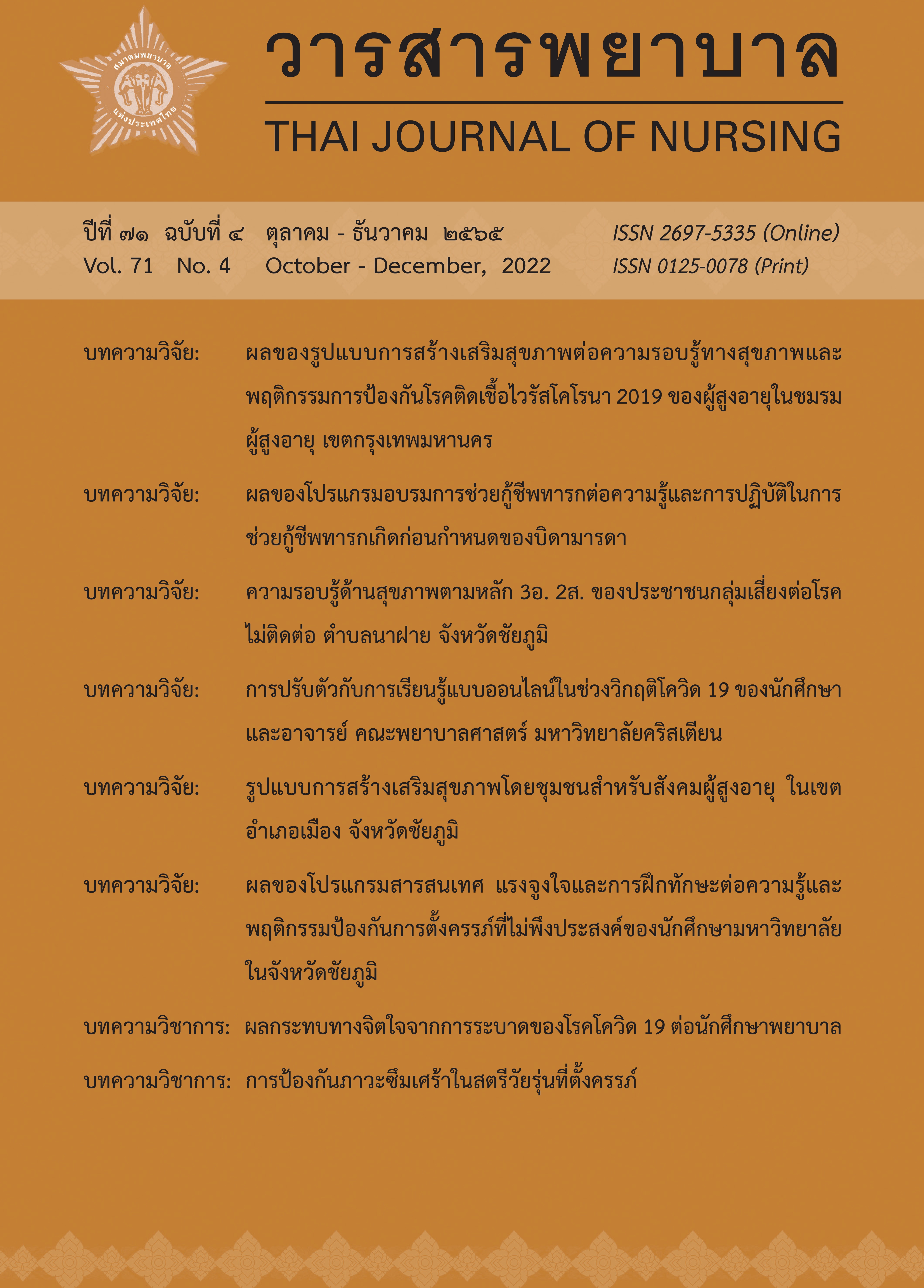Health literacy based on principles of “ 3E. 2S.” among risk persons of non-communicable diseases at Tambon Na Fai in Changwat Chaiyaphum
Main Article Content
Abstract
This descriptive research aims to assess health literacy based on principles of “ 3E. 2S. ” (Eating, Exercise, Emotion, Stop Smoking, Stop Drinking) among risk persons of non-communicable diseases at Tambon Na Fai in Changwat Chaiyaphum. Using the stratified random sampling, the sample of 394 people was selected. The research instruments included the health literacy based on principles of “ 3E. 2S. ” questionnaire for persons aged 15 years and above. The results found that the sample’s health literacy in the following components; needed health knowledge and understanding, accessing information and services, and participating in social health literacy were at low level (37.6%, 40.1%, and 46.6 % respectively) while communicating with professionals, making appropriate health decisions to good practice, managing their health condition, and getting media and information literacy were at moderate level (59.6%, 48.7%, 39.3% and 74.9%. respectively). Their maintaining healthy behavior in eating behavior, exercise, and emotion were at moderate level (76.96%, 58.1%, and 75.46 %, respectively). In addition, their smoking behavior were at low level (47.0 %) but alcohol consumption were at high level (45.4%)
Article Details

This work is licensed under a Creative Commons Attribution-NonCommercial-NoDerivatives 4.0 International License.
References
กระทรวงสาธารณสุข กรมควบคุมโรค กองโรคไม่ติดต่อ. (2563). ข้อมูลโรคไม่ติดต่อ. สืบค้นเมื่อ 24 มิถุนายน 2563, จาก http://www.thaincd.com /2016/mission/documents-detail.php?id=14220&tid =32&gid=1-020
เกศินี สราญฤทธิชัย. (2564). ความรอบรู้ด้านสุขภาพ: แนวคิด ทฤษฎีและการประยุกต์ใช้. ขอนแก่น: คลังนานาวิทยา.
ชาญยุทธ พรหมประพัฒน์. (3 มีนาคม 2561). ห่างไกลโรคNCD ด้วยหลัก 3อ. 2ส. ในมหกรรมสุขภาพโรค ไม่ติดต่อ (NCD Forum 2017) จัดโดยกระทรวงสาธารณสุข. ThaiHealth Official.
ธัญชนก ขุมทอง, วิราภรณ์ โพธิศิริ, และขวัญเมือง แก้วดำเกิง. (2559). ปัจจัยที่มีผลต่อความรอบรู้ด้านสุขภาพของประชากรกลุ่มเสี่ยงโรคเบาหวานและความดันโลหิต สูงในจังหวัดอุทัยธานีและอ่างทอง. วารสารสาขาวิทยาศาสตร์และเทคโนโลยี, 3(6), 67-85.
นริศรา แก้วบรรจักร, ประไพจิตร ชุมแวงวาปี, และกฤชกันทร สุวรรณพันธุ์. (2563). ปัจจัยความรอบรู้ทางสุขภาพที่มีความสัมพันธ์กับพฤติกรรมสุขภาพ ของผู้สูงอายุที่เป็นโรคความดันโลหิตสูงตำบลโคกสี อำเภอเมือง จังหวัดขอนแก่น. วารสารสาธารณสุขและวิทยาศาสตร์สุขภาพ, 3(3), 1-15.
วรรณี นิธิยานันท์ (8 พฤศจิกายน 2562) .งานแถลงข่าววันเบาหวานโลก 2562 World Diabetes Day Thailand 2019 Together Fight Diabetes. สืบค้นเมื่อ 24 มิถุนายน 2563, จาก https://www.hfocus.org/content/2019/11/18014
สุพัตรา ศรีวณิชชากร. (2564). การจัดการโรคไม่ ติดต่อ เรื้อรัง (NCDs) ในประเทศไทย และความท้าทายของหน่วย บริการปฐมภูมิ. วารสารระบบบริการปฐมภูมิและเวชศาสตร์ครอบครัว, 4(2), 4-7.
สมใจ วินิจกุล, และนุศทิพย์ แสนคำ. (2559). ปัจจัยทำนายพฤติกรรมสร้างเสริมสุขภาพผู้ป่วยโรคเรื้อรังในชุมชน. วารสารสาธารณสุขศาสตร์, 46(1), 5-15.
เสาวภา ดงหงษ์, รุ่งรัตน์ ศรีสุริยเวศน์, และพรนภา หอมสินธุ์. (2564). ปัจจัยที่มีความสัมพันธ์กับความรอบรู้ ด้านสุขภาพของทหารกองประจำการ จังหวัดชลบุรี. วารสารคณะพยาบาลศาสตร์ มหาวิทยาลัยบูรพา, 29(2), 15-23.
อรวรรณ นามมนตรี. (2561). ความรอบรู้ด้านสุขภาพ (Health literacy). วารสารทันตาภิบาล, 29(1), 122-128.
อารีย์ แร่ทอง. (2562). ความรอบรู้ด้านสุขภาพและพฤติกรรมสุขภาพ 3อ. 2ส. ของอาสาสมัครสาธารณสุขประจำหมู่บ้าน กรณีศึกษาตำบลหินตก อำเภอร่อนพิบูลย์ จังหวัดนครศรีธรรมราช. วารสารวิชาการกรมสนับสนุนบริการสุขภาพ, 15(3), 62-70.
Ungsinun Intarakamhang, & Yuttapong Kwanchuen. (2016). The development and application of the ABCDE-health literacy scale for Thais. Asian Biomedicine, 10(6), 587-594.
World Health Organization. (1998 ). Health promotion glossary. Geneva: Author. Retrieved December 27, 2020, from http://www.who.int/healthpromotion/about/HPR% 20Glossary%201998.pdf
Yamane, T. (1973). Statistics: An introductory analysis (3rd.ed.). New York: Harper & Row.


